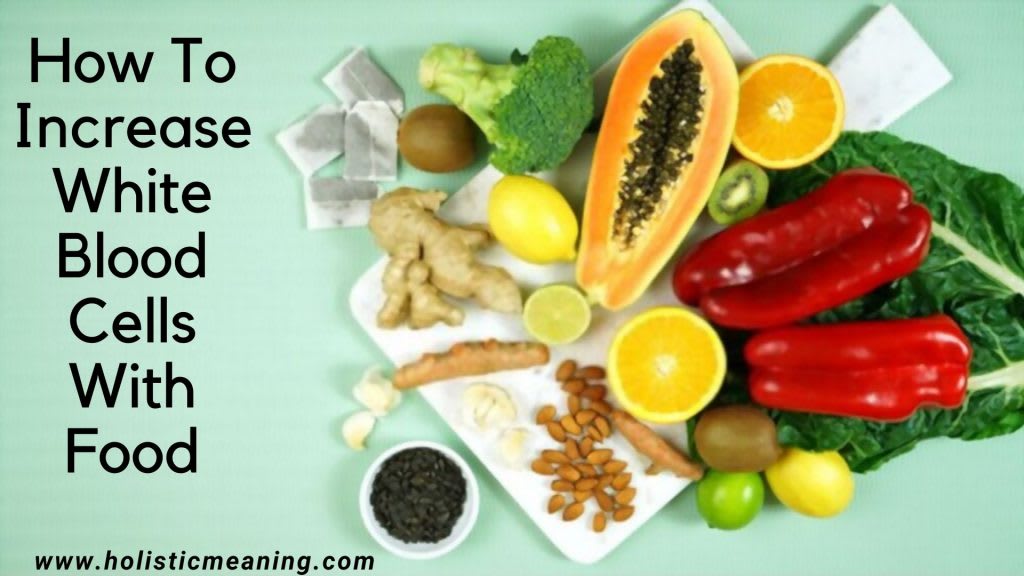How To Increase White Blood Cells With Food in 2021
Foods To Raise White Blood Cells

Foods To Raise White Blood Cells
White blood cells are essential for your body and it has been observed that people are finding difficulty to raise WBC and many people are asking How To Increase White Blood Cells With Food or what foods increase white blood cell and supplements to increase white blood cells. I will try to give me the best to explain it and provide you with the source to raise White Blood Cells Naturally.
White blood cells are essential for your immune system to function properly. If you want to be healthy, then we will tell you what foods can favour your leukocytes.
White blood cells or leukocytes are immune cells liable for fighting viruses, bacteria or external agents that affect your health. According to the University of Rochester, although they only make up 1 per cent of your blood, their presence is necessary to prevent disease.
The number of white blood cells in your bloodstream may decrease when you have infections and conditions that weaken the immune system, such as HIV, AIDS, or cancer treatment. The United States Academy of Nutrition and Dietetics noted that hygiene and a high-protein diet aided in the production of white blood cells. If you want to maintain a strong immune system, these foods can benefit your white blood cells.
Top 10 Foods To Raise White Blood Cells

Top 10 Foods To Raise White Blood Cells
Citrus
The health site Healthline states that vitamin C increases white blood cell production and supports the immune system's response to the common cold.
In addition to being rich in this nutrient, there are a variety of citrus fruits that you can include in your diet: orange, tangerine, lemon, lemon or grapefruit. The Office of Dietary Supplements recommends a daily intake of 75 to 90 mg of vitamin C for adults.
Seafood
The shell is rich in zinc. The Office of Dietary Supplements states that this mineral is present in cells throughout the body, as it is necessary to build proteins and strengthen the immune system against the presence of pathogens that can harm us.
In developing countries, zinc deficiency has been linked to an increased risk of pneumonia, particularly in older adults and children.
Snails with the highest zinc content contain oysters, crabs, and muscles. It is important that you do not waste your intake, since excess zinc can cause the opposite effect than expected.
Chicken
According to the United States Department of Agriculture database, a skinless chicken breast provides 53 grams of protein. In turn, this macronutrient contains amino acids, which are important for the production of new leukocytes. Chicken is rich in another essential compound for the immune system: vitamin B6.
Almond
According to the United States Office of Dietary Supplements, vitamin E improves the immune system against the risk of viruses and bacteria.
For its part, Healthline ensures that almonds are the best source of this nutrient. Just half a cup is enough to reach the recommended daily intake of vitamin E. They are also rich in proteins, which are necessary for the formation of white blood cells.
Red peppers
Healthline notes that red bell peppers have three times the vitamin C of an orange. In addition, the University of Rochester has reported that this food contains beta-carotene, a compound that aids in the production of vitamin A, has antioxidant properties, and maintains the health of cells of the immune system, namely leukocytes.
Black tea
According to a Harvard University study, drinking five cups of black tea a day causes the defences of the immune system to quadruple after two weeks due to theanine.
Fungi
They contain selenium, which helps white blood cells produce cytokines to kill disease, and beta-glucan, a type of antimicrobial that activates cells that find and destroy the infection.
Bitter chocolate
A study published in the British Journal of Nutrition says that this food can boost immunity, which protects against diseases, including respiratory diseases, as research shows.
Beta carotene
This substance improves the body's defences and is essential for the growth and development of cells of the immune system, which helps to neutralize toxins. It is present in foods such as carrots, sweet potatoes and squash.
Zinc
This mineral is necessary for the function of white blood cells and acts as a catalyst in the murderous response of the immune system to foreign bodies. Some foods that contain it are oysters, peanuts, eggs, wheat germ and sunflower seeds.
In addition to the above, yoghurt can be very beneficial for the immune system, it helps to produce antibodies and strengthens the white blood cells.
If you have any doubts about the intake of any of these foods, consult an expert.
How To Increase White Blood Cell Count Naturally
In addition to eating, there are daily habits that we must take into account when increasing the white blood cell count :
- Daily exercise: approximately 30 minutes, this allows the white blood cells and antibodies to move much faster throughout the body.
- Avoid stressful situations: this being the main trigger for most diseases, you should try to avoid it by trying to handle situations with calm and relaxation.
- Increase your water intake: at least 12 glasses of water a day to boost the immune system.
- Relaxation therapies: for at least 15 minutes a day you should practice deep breathing exercise.
- Avoid sedentary lifestyle: it is not essential to maintain a daily intense exercise routine, however, it is recommended to be active at all times, such as walking or jogging to increase adrenaline and also the body's defences.
- Rest as long as necessary: this will be vital to regain energy and boost the immune system.
People also ask
How can I increase my white blood cells naturally?
Eating vitamin C will help regulate the level of white blood cells in your body. Fruits like lemons, oranges and lime are rich in vitamin C, as are papaya, berries, guava, and pineapple. You can also get vitamin C from vegetables like cauliflower, broccoli, carrots, and bell peppers.
What foods to avoid if you have low white blood cells?
If you have neutropenia, you should avoid raw meat, eggs and fish, mould or expired foods, unripe or mouldy fruits and vegetables, vegetable juices, beer, milk, and unexpected honey.
How do you treat low white blood cell count?
Medicines can be used to stimulate your body to make more blood cells. Or, medications may be prescribed to clear up the cause of the low cell count as an antifungal to treat yeast infections or antibiotics to treat bacterial infections.
What is the most common reason for low white blood cell count?
A low white blood cell count is usually due to a viral infection that temporarily disrupts bone marrow function. Some disorders present at birth (congenital) in which bone marrow function is reduced.
How long does it take white blood cells to regenerate?
Your neutrophil count begins to rise again. This is because your bone marrow restarts normal neutrophil production. But again, it can take 3 to 4 weeks to reach a normal level.
Does exercise increase white blood cells?
White blood cells are the cells of the body's immune system that fight disease. These antibodies or leukocytes are transmitted more quickly, so they can detect diseases more than before.
Does apple cider vinegar help white blood cells?
Effect of apple cider vinegar on the elimination of microbes by white blood cells. Apple cider vinegar reduces the effectiveness of bacteria and yeast growth. It helps clean white blood cells like macrophages and adds these microbes which in turn will reduce inflammation and harmful cytokine secretion.
Does garlic increase white blood cells?
Feeding garlic for 30 days significantly (P <0.05) increased red blood cell count, haemoglobin concentration, and PCV compared to controls. Additionally, mice made from garlic showed a significant increase in the total white blood cell, neutrophil, monocyte, and lymphocyte count.
Does coffee affect white blood cell count?
The apparent increase in the number of white blood cells in the group that received caffeine appears to be due to greater muscle tension and, consequently, to a more acute injury of the endothelial and muscle cells. The use of caffeine can increase the risk of muscle damage in athletes.
Does vitamin C increase white blood cells?
First, vitamin C helps stimulate the production of white blood cells called lymphocytes and phagocytes, which help protect the body against infection.
That's it for this article, like, comment and share with your friends and family. If you really like my work then you can send me a tip as a gift so that I can provide you such content.
About the Creator
Mustafa Rangoonwala
Hello Reader,
My Name is Mustafa Rangoonwala, I am an Holistic Practitioner since last 7+ Years. I am a Graphologist, NLPMP, Reiki Master Practitioner, Ganotherapist and Vastu Consultant.
I have recently joined Vocal..Support me !!!!!!





Comments
There are no comments for this story
Be the first to respond and start the conversation.